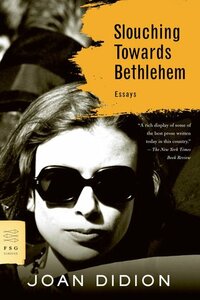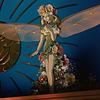Take a photo of a barcode or cover
challenging
informative
reflective
medium-paced
mysterious
medium-paced
reflective
slow-paced
Remarkably eloquent. I knew not what I was getting into when I picked up this book, including whether it was fiction or nonfiction. I simply knew that it was high time I read something by Joan Didion and I am glad that I did. Many of these essays are all in all simple accounts, the prose not overly flowery, but Didion is efficient with her words, able to transfer the reader in time and place to incredible effect. There is a filter of a slightly languid ariness or distance that prevades all of these pieces which creates a distinct voice that I am curious to see if it pervades her fiction as well.
reflective
informative
reflective
fast-paced
I was left with two feelings , the desire to know more and the question of do essayists still write like this? I thought I've read a lot of articles in different magazines and websites but the writing isn't like this.... Joan Didion writes reality that feels like fiction.
She writes as though she was a tiny fly in the room, forgotten, unnoticed, and opinionated. I don't necessarily feel like I am getting facts but I do feel that I know exactly how Joan feels about everything she writes about.
Slouching Toward Bethlehem is an anthology of essays that detail the experience of living in California in the 1960's. Specifically regarding the entrance of the United States in the Vietnam War and the emergence and neutering of the hippy counter-culture. While the titular essay as well as On Morality were both particularly thought provoking I enjoyed the essays that were more about Joan's own experiences of California, mainly Los Angeles Notebook.
I wish the themes of the essays were more fluid. There were a lot of shared themes of woman hood but then it felt like some of the essays didn't fit like Rock of Ages and the essays about Hawaii...they just felt a little removed from the others essays.
I've removed half a star for the usage of the f-slur. Even if it's of the time Joan has the aura of someone who would fetishize gay men....
She writes as though she was a tiny fly in the room, forgotten, unnoticed, and opinionated. I don't necessarily feel like I am getting facts but I do feel that I know exactly how Joan feels about everything she writes about.
Slouching Toward Bethlehem is an anthology of essays that detail the experience of living in California in the 1960's. Specifically regarding the entrance of the United States in the Vietnam War and the emergence and neutering of the hippy counter-culture. While the titular essay as well as On Morality were both particularly thought provoking I enjoyed the essays that were more about Joan's own experiences of California, mainly Los Angeles Notebook.
I wish the themes of the essays were more fluid. There were a lot of shared themes of woman hood but then it felt like some of the essays didn't fit like Rock of Ages and the essays about Hawaii...they just felt a little removed from the others essays.
I've removed half a star for the usage of the f-slur. Even if it's of the time Joan has the aura of someone who would fetishize gay men....
reflective
slow-paced
didion has so much love for america, specifically california, and the stories that make up the mysticism of the lad. i enjoyed the essays on muderesses, headmistresses and communists. however, i felt she was showing a glaringly white perspective on topics i think required more nuance, like hawaii and the random occasion of watching blackface? a lot of the essays didn't really have a point, and as someone who isn't american i got bored pretty quickly with some of them.
Joan Didion is a very good writer. Notice I don't employ the word exceptional or extraordinary--I'm becoming cheap--but that way no one will say I don't recognise her skill.
This is a long collection of essays mostly on 1960s California, which seems to be as crowd-pleasing now as it was then (my dad was unsurprised when I told him it seems to be a common "modern favourite." This phenomenon is still odd to me, however; my theory had been that it is a "modern favorite" because, with its current moment, readers discover for the first time the peculiar and generalised joy of reading an essay collection)
There are, in my opinion, amongst the twenty individual pieces, only six essays I wouldn't mind re-reading again:
- Comrade Laski, C.P.U.S.A(M.-L.)
- On Keeping a Notebook
- Letter from Paradise 21°19'N., 157°52'W
- Guamas, Sonora
- Los Angeles Notebook
- Goodbye to All That
The irony of this choice is that the majority of them are firmly in the not-"about-calfornia" category for which Didion is known. They are, instead, mostly from the personals section, which are more generaly worth reading.
Comrade Laski was the only really good California essay, and illustrates best, perhaps, the reason I did not like the others. California of the 1960s seems to me a wad of self-styled world-changing hippies disguising themslves as communists or intellectuals and educators who believe that they have found some sort of enlightenment. the answer. It is the California of the films and dreams and fantasies of fools. But that California has only continued to exist because the grownups, who lived elsewhere, allowed it.
This is a long collection of essays mostly on 1960s California, which seems to be as crowd-pleasing now as it was then (my dad was unsurprised when I told him it seems to be a common "modern favourite." This phenomenon is still odd to me, however; my theory had been that it is a "modern favorite" because, with its current moment, readers discover for the first time the peculiar and generalised joy of reading an essay collection)
There are, in my opinion, amongst the twenty individual pieces, only six essays I wouldn't mind re-reading again:
- Comrade Laski, C.P.U.S.A(M.-L.)
- On Keeping a Notebook
- Letter from Paradise 21°19'N., 157°52'W
- Guamas, Sonora
- Los Angeles Notebook
- Goodbye to All That
The irony of this choice is that the majority of them are firmly in the not-"about-calfornia" category for which Didion is known. They are, instead, mostly from the personals section, which are more generaly worth reading.
Comrade Laski was the only really good California essay, and illustrates best, perhaps, the reason I did not like the others. California of the 1960s seems to me a wad of self-styled world-changing hippies disguising themslves as communists or intellectuals and educators who believe that they have found some sort of enlightenment. the answer. It is the California of the films and dreams and fantasies of fools. But that California has only continued to exist because the grownups, who lived elsewhere, allowed it.
One does not think of him eating, or in bed.
Michael Laski, you see, did not feel as close to me as I did to him
One day Norris asks how old I am. I tell him I am thirty-two. It takes a few minutes, but Norris roses to it. “Don’t worry,” he says at last. “There’s old hippies too.”
Joan Baez was a personality before she was entirely a person, and, like anyone to whom that happens, she is in a sense a hapless victim of what others have seen in her, written about her, wanted her to be and not to be.
Although I have felt compelled to write things down since I was five years old, I doubt that my daughter ever will, for she is a singularly blessed and accepting child, delighted with life exactly as life presents itself to her, unafraid to go to sleep and unafraid to wake up. Keepers of private notebooks are a different breed altogether, lonely and resistant rearrangers of things, anxious malcontents, children afflicted apparently at birth with some presentiment of loss.
I had somehow thought myself academic Roskolnikov
...and I faced myself that day with the nonplused apprehension of someone who has come accross a vampire with no crucifix at hand
I never told my father that I needed money because then he would have sent it, and I would never know if I could do it by myself.
reflective
slow-paced





